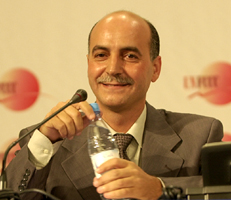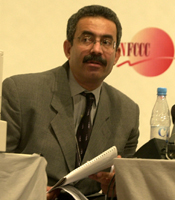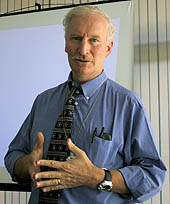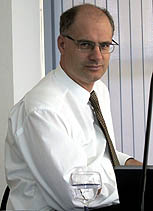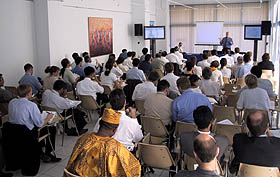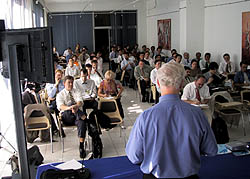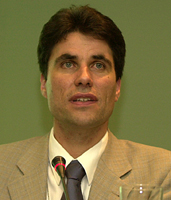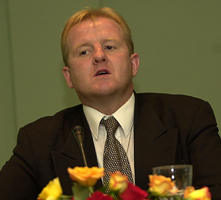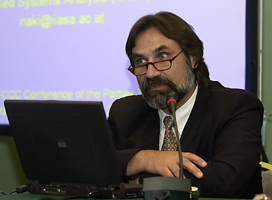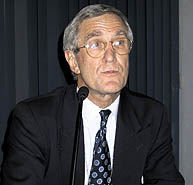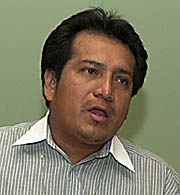|
|
|||||||||||||||||||||||||||||||||||||||||
|
|||||||||||||||||||||||||||||||||||||||||
|
Events convened on Thursday, 1 November 2001 |
|
Climate change in three Maghreb countries
Presented by the delegations of Morocco, Algeria and Tunisia
Michael Zammit-Cutajar, Executive Secretary of the UNFCCC Secretariat, thanked and encouraged the Maghreb countries for their work in developing national communications. Ménouèr Boughedaoui, Université de Blida, presented Algeria's national communication. He explained that Algeria is a semi-arid region which suffers from limited water resources, soil degradation, desertification and drought, and is therefore vulnerable to climate change impacts. Climate change models illustrate that a doubling of atmospheric carbon dioxide (CO2) concentrations will lead to a 2.2ºC increase in Algeria's average temperature, and an eight percent decrease in annual precipitation. Boughedaoui noted that Algeria has undertaken several voluntary climate change mitigation measures, including establishing an agency to promote renewable energy and energy efficiency, adopting a regulatory framework, and enacting an energy law. Algeria has also developed a portfolio of potential CDM projects on renewable energy, energy efficiency, transportation and reforestation.
Samir Amous, APEX Conseil, noted that the energy sector is responsible for over half of Tunisia's greenhouse gas emissions (GHG), but that Tunisia has low per capita emissions compared to many Annex I countries. Amous explained that Tunisia has developed a portfolio of 47 potential CDM projects, including reforestation, waste, cogeneration, biomass, wind power, demand management, and micro-hydro projects. Faouzi Senhaji, Groupe d'Etudes et de Recherches sur les Energies Renouvelables et l'Environnement, presented Morocco's national communication. He explained that climate change will: cause Morocco's temperatures to increase and precipitation to decrease; have adverse impacts on Morocco's water supply and agricultural yield; and cause an increase in extreme weather events. He reported that Morocco has identified 23 potential mitigation projects, but that it will require additional resources to implement capacity-building programmes and to carry out adaptation and mitigation plans. Senhaji noted that Morocco has developed a portfolio of potential CDM projects, including projects on renewable energy, energy efficiency, waste, industrial processes and reforestation.
|
|
Pioneering the CDM/JI market: Lessons from Prototype Carbon Fund deals Presented by the World Bank
Kenneth Newcombe,
PCF Fund Manager, gave an overview of the PCF's activities, and
responded to a question regarding its future plans for moving
beyond being a prototype fund. Johannes
Heister, PCF Senior Economist, described how PCF projects establish
their baseline. Newcombe
then discussed carbon finance and financial projections for PCF
projects, based on the PCF's introductory price of US$3/ton of
carbon equivalent. He noted several possible synergies, including
protection of biodiversity and improved solid waste management
in developing countries. Please visit the PCF's website to view and order their newly-released annual report.
|
|
The financial sector and climate change Presented by UNEP Finance Initiatives (UNEP FI) At this event, representatives from the UNEP FI Climate Change Working Group and the financial services sector discussed the risks and opportunities posed by climate change for the financial sector, and presented papers and case studies of emissions reductions and trading schemes.
Erik Schmausser, Swiss Re, provided an overview of UNEP FI's recently released Climate Change Position Paper. The paper: advocates the use of the precautionary approach in addressing climate change; expresses the financial sector's support for the Kyoto Protocol and for a long-term and effective framework to address climate change; acknowledges the significant risks, as well as opportunities posed by climate change; and urges early action through awareness raising, mitigation, adaptation and research. Matthew Varilek, Natsource, presented a paper that offers predictions of GHG price scenarios for 2000-2012. By examining results of various GHG market models, analyses of variables not previously considered, experience from SO2 market models and prices, and emerging prices in the emerging GHG market, the paper presents price predictions for three policy scenarios (full international trading, Annex I trading only, and domestic measures only). The paper projects that, for 2000-2004, prices per ton of carbon equivalent are likely to remain at approximately their current levels; for 2005-2007, prices are likely to be lower, perhaps at EUR 10 or less; and for 2008-2012, while most models converge in the EUR 10-20 range, actual prices are likely to remain below EUR 10. Jorge Barrigh, CAF, outlined CAF's Latin American Carbon Programme (PLAC), which was launched in 1999 to complement activities on disaster mitigation from El Niño and jump-start the carbon market in Latin America. PLAC's mission is to develop real commercial opportunities within the emerging carbon market, and to leverage experience and competitive advantage to benefit its customers. Michel Matthey de l'Etang, UBS, outlined UBS' Alternative Climate programme, which facilitates investments in climate mitigation projects and aims to reduce CO2 emissions, generate certificates and create financial returns for investors. Schmausser described a major finance sector study on the future GHG emissions market which will be launched next year. The study will aim to identify an appropriate macro-level policy to bring climate change within physically and financially "safe" levels, and recommend appropriate market frameworks that will encourage financial institutions to engage in the GHG market. The study will provide a better understanding of the future market of GHG reductions, identify options for innovative financial products and services in this market, identify best practices in climate change adaptation and mitigation projects, and make recommendations on appropriate political actions to encourage financial activities in these area.
|
|
Good practice guidance and uncertainty management in national GHG inventories for the LULUCF sector Presented by the Intergovernmental Panel on Climate Change (IPCC)
Jim Penman, IPCC, explained that the report will: assess ways to undertake consistent representations of land areas; provide good practice guidance for reporting specifically linked to the Revised 1996 IPCC Guidelines; examine supplementary methods and good practice guidance to address issues arising from the Kyoto Protocol; and examine cross-cutting issues, including how to use available resources most effectively. Pipatti presented other IPCC work on LULUCF. She said the IPCC intends to develop definitions for direct human-induced "degradation" and "devegetation," and methodological options to inventory and report on emissions resulting from these activities. The IPCC also plans to develop practicable methodologies to factor out direct human-induced changes in carbon stocks from indirect human-induced emissions and those from natural sources. Robert Watson,
IPCC, explained that the IPCC would compile an options assessment
paper if invited to do so by the COP or SBSTA. The paper would
develop biome-specific forest definitions and analyze the implications
of different definitions of forest with regard to afforestation,
reforestation and deforestation activities. Watson also outlined
the scope of the paper on issues related to afforestation and
reforestation project activities under Article 12 (Clean Development
Mechanism) of the Kyoto Protocol.
Please
visit the UNFCCC's
"On Demand" webcast page for RealVideo coverage
of this event
|
|
Climate strategies under uncertainty Presented by the International Institute for Applied Systems Analysis (IIASA)
Leo Schrattenholzer, IIASA Environmentally Compatible Energy Strategies Project, presented the findings of an IIASA analysis of global sustainable development scenarios, which show that hydrogen fuel cells and solar photovoltaic cells emerge as key technologies in the long run, and that natural gas technologies could provide an efficient medium-term transition. Sten Nilsson, IIASA Forestry Project, stated that many opportunities exist to improve the atmospheric carbon balance through enhanced management of sinks, but that there are substantial uncertainties and risks. He explained that IIASA case studies demonstrate the need for full GHG accounting. He recommended the establishment of independent third party verification and certification of national inventory and reporting mechanisms to improve the quality of accounting and reporting. Günther Fischer, IIASA Land Use Change Project, described a recent IIASA study that examined the effects of climate change on regional agricultural production. The study highlights the heterogeneity of climate change impacts on different regions and of adaptive capacity among countries.
|
|
Greenhouse gas trading in the European Union Presented by the Emissions Marketing Association
Christoph
Bals, Germanwatch, explained that capping and trading GHG emissions
in the EU would: be environmentally effective and economically
efficient; manage regulatory risk efficiently; and lead to structural
changes within businesses. Michael Wriglesworth,
British Petroleum (BP), underscored many businesses' concerns
with the inclusion of absolute caps. He said BP favors a strategy
consistent with economic growth; supports emissions trading in
the EU and globally; and supports the implementation of emissions
trading in ways to build on existing national strategies. Delia Villagrasa,
European Business Council for a Sustainable Energy Future (e5),
stated that e5 favorably considers the
proposed directive, as it would: benefit small EU countries that
might otherwise have comparatively higher abatement costs; provide
regulatory certainty; and be a mandatory scheme with no opt-out
clause. The Council's criticisms of the proposed directive include
its slow time-frame for adoption, lack of clarity regarding emissions
allowance allocation, and the exclusion of some sectors from the
trading scheme.
|
|
Interrelations between the UNFCCC and the Convention on Biological Diversity and indigenous peoples Presented by Centro de Asistencia Legal Popular in collaboration with Friends of the Earth International
Meryam Demnati, Association Amazighe, highlighted the negative impacts of climate change and desertification on the Amazighe, indigenous peoples of Northern Africa and the Mediterranean. She expressed hope that proposals for special status and a working group on indigenous peoples would be received favorably by Parties. Mohamed Bouchdoug, Association Marocaine de Recherche et d'Echanges Culturels, provided examples of the impacts of climate change on indigenous peoples in Northern Africa, including: public and environmental health impacts resulting from the use of untreated wastewater for household and agricultural use; degradation of palm trees due to increased aridity; deterioration of a unique tree species in southwestern Morocco; and declining soil fertility due to salinization. Simone Lovera, Sobrevivencia - Friends of the Earth Paraguay, highlighted the negative impacts of mono-culture tree plantations on indigenous peoples, biodiversity, local communities and the environment. She stressed that growing trees will not necessarily lead to carbon sequestration, and called for more research on this issue. Lovera said the definition of forests adopted in Bonn would provide perverse incentives to replace real forests with tree plantations, and that classifying the planting of tree plantations as reforestation will not benefit the environment in most cases. Yuri Onodera, Friends of the Earth Japan, highlighted the risks associated with carbon sink project activities. He noted that Japanese and Australian companies have been announcing their own schemes of carbon crediting and increasing their investments in plantations. He said the Bonn Agreements' concession of large carbon sink credits to industrial countries was a "gift of no action."
|
|
For
further RealVideo coverage of these and other side-events at COP-7,
please visit the UNFCCC's "On Demand" webcast page |
|
| The Earth Negotiations Bulletin (ENB) on the side is a special publication of the International Institute for Sustainable Development (IISD) in cooperation with the United Nations Framework Convention on Climate Change (UNFCCC) Secretariat. The Editor of ENB on the side is Kira Schmidt <kira@iisd.org>. This issue has been written by Fiona Koza <fiona@iisd.org>, Dagmar Lohan <dagmar@iisd.org>, and Kira Schmidt <kira@iisd.org>. The Digital Editors are Andrei Henry <andrei@iisd.org>, Leila Mead <leila@iisd.org> and Kenneth Tong <ken@iisd.org>. Funding for publication of ENB on the side at COP-7 is provided by the UNFCCC Secretariat. The opinions expressed in ENB on the side are those of the authors and do not necessarily reflect the views of IISD and funders. Excerpts from ENB on the side may be used in non-commercial publications only and only with appropriate academic citation. For permission to use this material in commercial publications, contact the Managing Editor at <kimo@iisd.org>. Electronic versions of these issues of ENB on the side from COP-6 Part II can be found on the Linkages WWW server at http://enb.iisd.org/climate/cop7/enbots/. | |
|
|
| © 2001, IISD. All rights reserved. |
|



